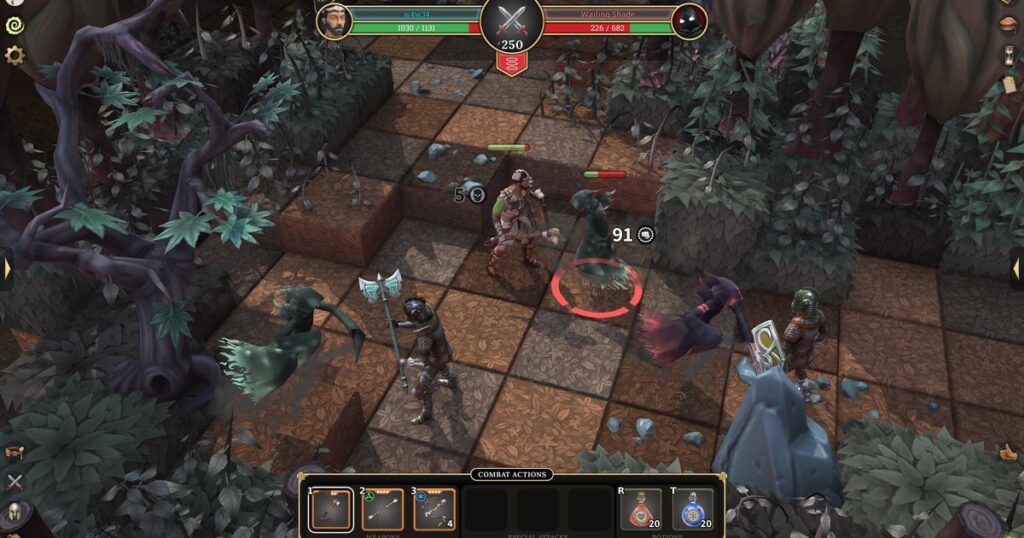Why RuneScape creator Andrew Gower has returned to MMORPGs with Brighter Shores

A new game from Andrew Gower has been a long time coming.
The British development veteran is best known for creating the hit 2001 MMORPG RuneScape – a title that is still very running today – and co-founding Jagex. In 2010, he departed the studio and, that same year, set up a new outfit, Fen Research, with the aim of creating a brand-new game engine.
This tech would become known as FenForge.
“I love making engines, even more than I love making games, believe it or not,” Gower laughs. “I saw that the computer game space was very, very competitive. I thought: ‘Well, there’s only two or three big engines. Maybe I can find a niche there’. I felt there was a lot that I could do to raise the bar in the quality of game engines.” There was one small obstacle in Gower’s mind: in order to sell and market a game engine, you usually need to have a project that showed off exactly what it was capable of.
“It’s a bit chicken and egg, really,” he explains. “The only way to promote an engine is to make a game to prove that it works because making games now requires a huge investment. No one is going to make that kind of investment on an unproven engine.”
As a result, Fen started work on making games that used the FenForge tech as it was being created. Work on one such project began in 2013; ‘Chasm game’ was a real-time strategy settlement building title with simulation elements.
“You had people that you could give orders to go do different things. It was a very, very different game,” Gower explains.
Over the course of three years, two staff at Fen created assets for Chasm, though no code was ever written for the project. But the game came to an end when it became apparent that there were a lot of people out there who wanted Andrew to return to his roots. As such, many of the assets built for Chasm were ultimately repurposed for Brighter Shores, an MMORPG.
“[While we were working on Chasm] every single person I spoke to asked whether I was working on another MMO,” Gower says. “After however many times that happened, I thought: ‘Clearly no one is interested in this game I’m making. I’m going to have to make another MMORPG’.”
Working on a new MMO allowed Gower to return to a genre he loved with the wealth of experience that he acquired while working on RuneScape. When development began on what would become Brighter Shores in 2016, it had been 18 years since he started working on RuneScape predecessor DeviousMUD and 17 years since Andrew and his brothers began building RuneScape.
“A lot of the thinking was just what would I do differently if I could start from scratch?” Gower says. “When you’re working on any sort of large project, over the years you build up a certain amount of history, which shapes the direction you have to go. It was nice to be able to step back and have none of that history, none of that baggage, and say from a completely clean slate, knowing what I know now, how would I make an MMO? So it was nice to be able to start from scratch like that.”
“I thought: ‘Clearly no one is interested in this game I’m making. I’m going to have to make another MMORPG'”
The industry has moved on in many ways since the creation of the original RuneScape. For one, there’s a lot more competition than there used to be, ranging from established MMOs to newer titles. Player expectations are very different to over 20 years ago, too.
“Back in 2000, there wasn’t really much else out there; there certainly wasn’t anything free-to-play out there,” Gower says.
“I spent way longer making this than I previously spent prior to launch and it still feels pretty small on release, even though it’s way bigger than anything I’ve ever made before. It’s just because the game’s just getting bigger and bigger and bigger and it’s becoming harder and harder to make a game of the scale people expect.”
Fen Research launched Brighter Shores into Early Access on November 6th. The aim is to be in alpha for six months, though Gower does admit he is sometimes optimistic with these estimates. As alluded to earlier, the idea is to get feedback early and use that to build out the game.
“I think we’re one of the few companies actually using Early Access the way it’s meant to be used,” Gower says.
“We’ve launched the game and we’ve got a ton of feedback that is very much shaping the way we make the game. I’m glad that we’re getting that feedback now before we’ve made too much content and whilst we can really take it on board and actually genuinely listen to our players. It’s nice to just build up the game with the player base and just gradually make it bigger and better.
“I’m expecting to be working on this for many years to come. It’s never going to be finished so whenever we launch it, it is going to be unfinished. I just wanted to get it out there and start getting people playing it and start seeing what works and what doesn’t work.”
.jpg?width=720&quality=70&format=jpg&auto=webp)
On the face of it, the design of Brighter Shores is cut from the same cloth as RuneScape’s. British medieval fantasy setting? Check. A variety of skills to level up? Well, they’re called professions now, but (mostly, sort of) check. A rock-paper-scissors-style combat triangle system? Check. But despite these similarities, Gower’s approach to game design has in fact changed – and matured – a great deal over the last 20 years.
“I forward plan much more now. I tend to make stuff up as I go along less,” he says.
“I have designed this to be a second screen game, because I’ve realised that’s what people want from my games”
“I’m still quite iterative because that is a good way to do things; you make things, you try things, you change things. But there are a lot more spreadsheets involved now, let’s put it that way. There’s a lot more thinking through what the consequences of things are going to be down the line, how things are going to work, planning it out many years in advance so I don’t design myself into a corner.”
The game is also designed to cater for people who might not have the same amount of free time to play games as they used to. Part of this is Brighter Shores’ passive abilities, where player characters can continue to grind automatically when the user isn’t even playing the game.
“As I have grown older, I haven’t lost my love of MMOs, but I do have less spare time, which is why this game has been designed the whole passive system,” Gower explains. “I was trying to make something where I could still carry on levelling up, even if I could only spend 15 or 20 minutes a day playing it.
“It’s basically targeted at people who love MMOs and grew up playing these games, but maybe don’t have as much free time anymore. If they’ve got a weekend free, they can grind away at it, but they can also set their character passively doing stuff and just do the quests and so on when they want. But I have also tried to make it appeal to people who want to sink the hours in.”
.jpg?width=720&quality=70&format=jpg&auto=webp)
.jpg?width=720&quality=70&format=jpg&auto=webp)
.jpg?width=720&quality=70&format=jpg&auto=webp)
.jpg?width=720&quality=70&format=jpg&auto=webp)
In some ways, this design philosophy is a reaction to how some RuneScape fans play the MMO. Many enjoy it as a second-screen game while they are doing something else.
“I have designed this to be a second screen game, because I’ve realised that’s what people want from my games,” Gower says. “But I have tried to make it both a second screen game, and I’ve tried to make it a completely passive experience where you can get rewards overnight if you haven’t got the time as well. I’ve tried to get both of those in there.”
At the moment, Brighter Shores has a Mostly Positive user rating on Steam. For Gower and Fen, the launch has also served as a good advertisement for the FenForge tech.
“There are about two million lines of code and very few issues, a testament to the fact the engine is working”
“We had a few little teething issues on the very first day but it’s been really very rock solid, much more stable and bug-free than most games in Early Access,” Gower says. “It’s really proven that the engine does work. It’s a massive game. There are about two million lines of code and we’ve had very few issues, which is a testament to the fact that the engine is working. The launch has also helped us find a lot of the bugs. It’s done very well in terms of the performance of the engine.”
Looking to the future, the plan is still to eventually sell FenForge as an off-the-shelf engine. For now, though, Gower and Fen Research are focused on building out Brighter Shores.
“Brighter Shores is very much my hobby project,” he says. “I’m making it because I want to have an MMO that I can enjoy making, running and sharing with the userbase. The plan is just to keep on making it bigger and bigger. We’ve got a very strong foundation, so content is the main thing we need more of now.”
He concludes: “In the long run, I still want to launch FenForge, but that’s not going to be for at least a couple of years because all my focus is on Brighter Shores at the moment. And it needs some documentation for a start.”
Source link : Gamesindustry


